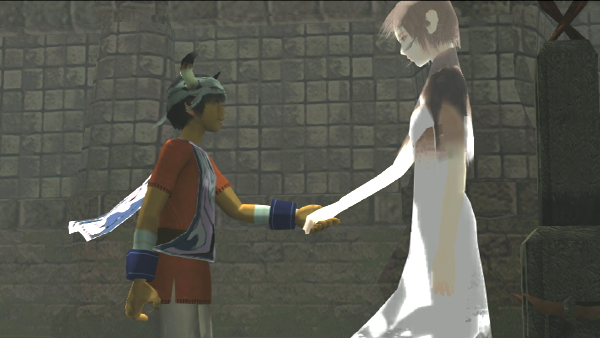Clifford’s here to save the day
[Mid-game spoiler warning for Ico. If you haven’t played it yet I suggest you skip the next three paragraphs, past the first image so as not to ruin a great moment.]
Everyone talks about how moving the endings of both Ico and Shadow of the Colossus are, along with a few other emotional scenes. While I do concede that SOTC is the better overall game, the scene that really hit me like a sack of rice occurred about mid-way through Ico at a broken bridge much like in this trailer for The Last Guardian.
The whole game you must lead Yorda through the castle complex by holding her hand by keeping a button pressed, as well as direct her limited movement all the while constantly protecting her from various enemies. She never helps or does anything, but Ico’s determination is unfailing. It is only when a bridge is destroyed and Ico is about to fall to his doom when Yorda finally reaches out her hand to save him, finally reciprocating all the care (and love?) he has done for her.
Besides the obvious implication of having someone finally show they appreciate all you do for them and reciprocate that love, it could be expanded to have various meanings. Not as lovers or friends, but as parents putting their heart and soul into providing for their children while expecting nothing in return, then eventually having the favor returned when the kids grow up, realize, and appreciate what has been done for them. More broadly it could stand to show that with enough hard work and dedication, eventually you’ll break through. None of these are a stretch. Art is not about what meaning, if any, the artist puts into something, but what you take out of it.

Director Fumito Ueda would agree, remarking that (on whether or not Last Guardian is in the same universe as the previous titles) “The way I see it, maybe they are from the same world, or the same universe. But anything further than that is really up to the player’s imagination. Everyone has a different level of relationship with the two previous titles, so we wouldn’t dictate that it is or it isn’t. It’s up to the player.”
While Ueda admits they didn’t do everything they could have in the same way they didn’t accomplish everything they set out to do with the previous games, they seem to have put a lot of passion and energy into this one, particularly with regard to the large griffin-like chimera called Trico, citing emotional experience rather than scientific research: “When I was younger, I grew up in a home that had a bunch of animals. My experiences with them are great memories that I still have…But it’s really all based on my childhood memories, the way I interacted with the animals, the way they reacted to me.” Ueda and company want the players to feel as if Trico is real and alive, reaffirming “at the end of playing through the game, if the player feels the existence of Trico, like it’s really there, then we have accomplished what we set out to do.”
When asked about “expanding the appeal of video games,” Ueda thinks there should be less barriers to entry on the grounds of skill. He’s quick to defend himself on that statement though, stating “ I’m not saying that games need to be easy or casual or anything like that.” He mentions arcade games are limited by a certain amount of time or lives, but contrasts that with console games, “there’s no need to put a time limit or game over screen — we want people to play longer. But again, whether it’s skill requirements, or continuous challenges until you feel like giving up… if they felt slightly more accessible, then maybe more people would enjoy playing video games.”
The Last Guardian: New CG Trailer, Q&A [PlayStation Blog]





Published: Nov 18, 2016 09:00 am